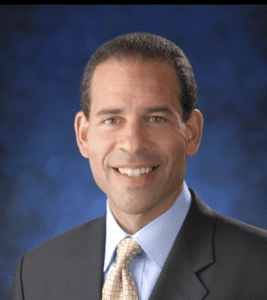Black History Month and a Father’s Influence | Robert E. Bristow, MD, MBA

Robert E. Bristow, MD, MBA
“It doesn’t take you long after you get out of a medical training program to realize that taking care of people one at a time is fine, but it’s nice if you can take care of an entire community and do something that affects a whole lot of people.” Those were my father’s words, Lonnie R. Bristow, MD, in 1994, on the cusp of being inaugurated as the first African American president of the American Medical Association (AMA) – an achievement worthy of recognition during Black History Month.1
Growing up, I obviously knew my father was a physician (Internal Medicine), that he loved his work, and that his patients loved him. Not infrequently, we would encounter his patients at the grocery store or a baseball game and they would express their gratitude that he was their physician. It inspired me to contemplate medicine as a career path for myself. In high school, I worked summers in the small office that he ran with my mother, a registered nurse, learning to draw blood and take x-rays. I knew he was well-respected and that he was frequently gone on trips to meetings. The meetings were a necessary byproduct of his commitment to serve a larger community, and his vehicle was organized medicine. It would only be later, as I progressed through my own path in medicine, that I would fully appreciate his accomplishments in a career that spanned almost five decades.
During his career, my father served on commissions and committees for the California Department of Health, advising on the treatment of sickle cell disease, healthcare in prisons, and statewide public health planning and development. He was on advisory committees for the Centers for Disease Control on smoking cessation and the prevention of HIV infection. He served on a presidential commission under the Clinton Administration advising on Social Security, testified before Congress, led the AMA’s battle against the tobacco industry, met with Speaker of the House Newt Gingrich to successfully advocate for preserving physician reimbursement during Medicare payment reform, and led efforts to repeal capital punishment in California. In the AMA, he rose through the ranks, serving on the Board of Trustees and Executive Committee, became the first African American Chair of the Board of Trustees, and ultimately the first African American President in the organization’s 148-year history. In 1977, he was elected to the Institute of Medicine of the National Academy of Sciences (now the National Academy of Medicine) and co-authored two seminal white papers – Crossing the Quality Chasm, which identified significant opportunities to systematically improve health care quality and reduce iatrogenic deaths in the United States, and In the Nation’s Compelling Interest, which was one of the first reports to define the benefits of pursuing diversity in the medical workforce.2,3
My father was born in 1930, three generations removed from emancipated slaves, and grew up in Harlem, New York as the son of a Baptist minister and an emergency room nurse. At age 16, he enrolled at Morehouse College and was a classmate of Martin Luther King Jr., who was a year ahead of him. After two years, realizing he was not ready for college, my father left school and served in the submarine service of the United States Navy for 4 years before resuming his education at City College of New York. He completed his medical education at New York University School of Medicine, while working two jobs to pay his way through school. He was one of three people of color in his graduating class, which was an anomaly because at the time (late 1950s), only two people of color were routinely admitted each year.
My parents never pushed me toward a career in medicine. They didn’t have to. I was and continue to be inspired by my father’s work ethic and his commitment both to help people “one person at a time” as well as to “do something that affects a whole lot of people.” For me, this has manifested not in the form of organized medicine, but rather in the dedication to train the next generation of health care providers and pursue health services research with the potential to impact whole populations.
The most salient and enduring advice my father offered was to always “just do your best.” Whether it was preparing for a college exam, a big football game, or the MCAT, taking care of my own patients, or managing an academic department, those words have always resonated with me. Their best, that’s all anyone can do. I give that same advice to my own children, students, and trainees. It’s especially relevant in today’s ultra-competitive environment, where everyone has to be in the top 5% of whatever they are pursuing to have a chance of realizing their goals. You can’t control what other people are going to do, only what you are going to do. So, just do your best. Advice, I think, that is applicable to all of us during Black History Month, as we reflect not only on how far we have come, but also on how far we have yet to go.
References
1. Bland A. California Physician, 1994; July: 22-25.
2. Committee on Quality of Health Care in America, Institute of Medicine. Crossing the Quality Chasm. 2001. ISBN 978-0-309-07280-9.
3. Smedley BD, Butler AS, Bristow LR. In the Nation’s Compelling Interest. Ensuring Diversity in the Healthcare Workforce. National Academies Press; 2004. ISBN 0-039-09125-X.
Dr. Bristow is a practicing Gynecologic Oncologist at the University of California, Irvine School of Medicine and currently serves as Professor and Chair of the Department of Obstetrics and Gynecology.